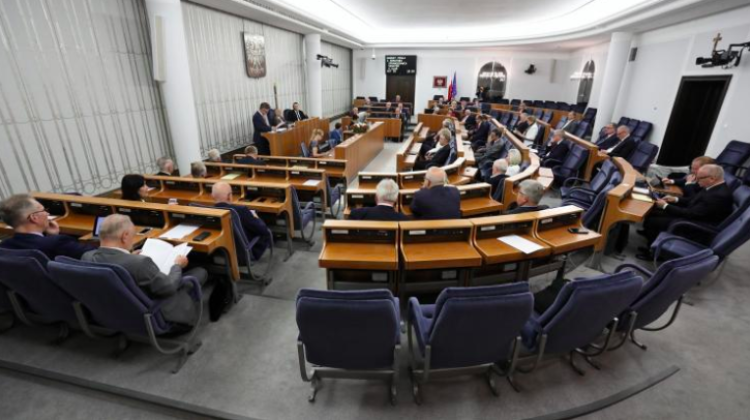The Senate passed the Law 2.0 with amendments and its introductory provisions without amendments
 Warsaw, 13.07.2018. Senate session. PAP/Tomasz Gzell
Warsaw, 13.07.2018. Senate session. PAP/Tomasz Gzell
The Senate passed the Law on Higher Education and Science (Law 2.0) with four amendments and its introductory provisions without amendments. This means that Law 2.0 returns to the Sejm. The two laws reform higher education and introduce major changes in the functioning of universities.
57 senators voted in favour of the Law 2.0 with 4 amendments, 20 were against and 2 abstained. 56 senators voted in favour of the provisions introducing the Law 2.0 without amendments, 24 were against.
According to one of the amendments to the Law 2.0 supported by the Senate, an institute of the Polish Academy of Sciences may be incorporated into an university at the request of the President of the Polish Academy of Sciences or the director of the Institute of the Polish Academy of Sciences. The amendment also introduces the obligation to consult the division of the Polish Academy of Sciences. The amendment was submitted by Senator Barbara Zdrojewska (PO). According to the original bill, the Minister of Science, by way of a regulation, could incorporate an institute of the Polish Academy of Sciences into an university after consulting the President of the Polish Academy of Sciences. President of the Polish Academy of Sciences Prof. Jerzy Duszyński protested against the provision in that form. In a interview with PAP in June, he said that this provision would threaten the independence of the Polish Academy of Sciences and its autonomy.
Another amendment approved by the Senate removes the requirement that individual inter-field studies be two-profile and multilevel studies.
The third of the adopted amendments introduces the right of incumbent judge of the Constitutional Tribunal, the Supreme Court or the Administrative Court and the retired judge to lifetime employment at an university irrespective of the result of the employee assessment.
The senators also passed the amendment providing for a reduction of requirements for people pursuing a doctoral degree. According to the current provisions, it is necessary to have a certified knowledge of a foreign language at the level of language proficiency C1 or higher. According to the amendment, "B2 or higher" level will be sufficient
The law will now return to the Sejm; its introductory provisions move to the signature of the President.
Before the vote on the provisions introducing Law 2.0, Senator Jan Żaryn (PiS) called for the adoption of several amendments. The main aim was to equalize the minimum wage of researchers employed at PAS institutes with the salaries of university teachers. "Failure to pass these amendments may be considered a basis for referring this law to the Constitutional Tribunal" - warned the senator. Ultimately, the Senate passed this bill without amendments.
Law 2.0, also referred to as the Constitution for Science, will replace the four existing ones: the Law on Higher Education, the Law on the Principles of Financing Science, the Law on Academic Degrees and Title, as well as the Law on Student Loans. The new law is expected to enter into force on October 1, 2018.
The bill makes many of the university`s options (including offering studies with a general academic profile and awarding academic degrees) dependent on the scientific categories that the university receives in its disciplines. In addition, after the reform, the right to offer studies and award academic degrees will be assigned to HEIs rather than to their organizational units. A new division of disciplines is planned, modelled on the division proposed by the OECD.
According to the bill, the governing bodies of a public university, in addition to the rector and senate, will also include a new body - the university council, chosen by the community of a given university. The rector will gain more power to shape the university`s policy, at the expense of collegial bodies, for example faculty boards.
The bill triggered discussions in the ruling camp. PiS senators also proposed amendments during the work on the bills.
In June, protests were organized against various provisions of the Law 2.0 in several places in Poland. Occupational strikes and protest actions were organized at the University of Warsaw, the Jagiellonian University, the University of Gdańsk, the University of Wrocław and the AGH. Parts of the communities at the University of Lodz, Opole, Rzeszów and Białystok, as well as NSZZ Solidarność at several universities also opposed the bill. The protests were organized by the Academic Protest Committee (a grassroots movement).
The students` self-governments of the universities and the authorities of the institutions have separated themselves from the protests. The bill was supported the institutions formally representing the academic environment: the Students` Parliament of the Republic of Poland, the National Representation of PhD Students, the Conference of Rectors of Public Vocational Schools (KRePSZ). The network of small and medium-sized academic institutions associating 25 higher education institutions also maintained its support for the bill. (PAP)
Author: Szymon Zdziebłowski
szz/ agt/ kap/
tr. RL
Przed dodaniem komentarza prosimy o zapoznanie z Regulaminem forum serwisu Nauka w Polsce.


















